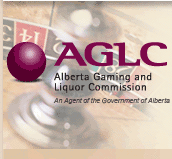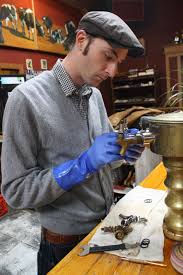 Earlier this week I received a copy of a letter from the AGLC to all beer industry representatives issuing a policy interpretation. The letter (which you can read here) states that, after some investigation, the AGLC has ruled that when breweries or agents clean tap lines for a pub, or pay for the cleaning of a tap line, they are engaging in the act of inducement. Therefore, henceforth (unless the ruling is reversed), cleaning a tap line for an account is illegal.
Earlier this week I received a copy of a letter from the AGLC to all beer industry representatives issuing a policy interpretation. The letter (which you can read here) states that, after some investigation, the AGLC has ruled that when breweries or agents clean tap lines for a pub, or pay for the cleaning of a tap line, they are engaging in the act of inducement. Therefore, henceforth (unless the ruling is reversed), cleaning a tap line for an account is illegal.
The core of their logic is the cost of cleaning a tap line is “something of value” and therefore forbidden under the AGLC regulations. The AGLC bans any form of inducement by producers and agents to bars, restaurants and liquor stores to purchase their product. An inducement is defined quite broadly to include almost any financial favour offered to accounts. The regulations explicitly exempt beer mats, tent cards, glassware and other such items, including, oddly, event tickets and fridges.
As you can appreciate local breweries and import agents are not happy about this ruling. Cleaning tap lines has become an industry-standard practice. The breweries defend it as an act of quality assurance. They claim the reality is that pub owners are not particularly careful about tap line maintenance and it is the brewery that suffers when dirty lines affect beer quality. Some of the more craft-focused places do their own tap cleaning, but most small bars simply don’t devote resources to regular cleaning practices, meaning it falls to the breweries to cover off this essential task.
I can appreciate their position on this matter. Cleaning tap lines is not a luxury for breweries and hardly going to make or break a deal. Leaving breweries dependent upon an under-resourced bar owner to tend their line is an uneasy prospect. Plus, I have observed a brewery cleaning all the lines, not just theirs, since it is just as easy once you are there and set up, meaning it is hardly a competitive activity.
That said, the policy wonk in me can understand the logic of the AGLC. Line cleaning costs money, either directly through contracting to a cleaner or through staff time. If a brewery or agent offers line cleaning as part of the deal to get a tap line, then it could be considered an inducement. Is agreeing to clean a line all that much different than offering to install the tap system (as has happened and is illegal)?
Except if you take the thinking to the next step, the logic starts to fall apart. I have two issues with the ruling. First, glassware, beer mats and other assorted promotional items also have a monetary value. Refrigerators most certainly do. How is it those cost items are not considered “of value” and excluded? Oilers tickets also have value (well, okay maybe not Oilers tickets, per se, but you get my point) but can be offered up to loyal accounts. Some of these things cost more than others, but the AGLC has never put a monetary minimum on the use of promotions – it applies a more qualitative test.
Second, and more importantly, this ruling needs to be seen in the context of the broader issue of inducements. To put it bluntly, the AGLC turns a blind eye to a whole raft of illegal inducement practices, and has for years. Even when presented with evidence, they refuse to step in an enforce the existing rules. Many breweries and agents regularly offer inducements – everything ranging from paying for the tap system installation, paying for exclusive tap lines, deals to offer 1 free keg for every few kegs purchased, to free trips for account principals and many other things. Yet, it has been years (more than a decade) since anyone has been penalized for such illegal activity.
The line cleaning ruling is an example of how the inducements policy has become a satire of itself. It simply lacks any reasonable credibility given the pathetic enforcement track record. Worse, it is evidence to feed the argument many make that the AGLC is aligned with the corporate brewers at the expense of small players. They turn a blind eye to the practices most commonly employed by the big boys but less commonly used by small breweries (as they can involve substantial financial outlay). However, they now argue that a fairly mundane practice such as line cleaning – and one that has a disproportionate effect on craft brewers – is forbidden. I can see why people would come to think that the AGLC is biased.
Of course, given their track record on enforcement, I am not sure how AGLC plans to ensure no one is cleaning lines. Are they going to follow brewery staff around all day, making sure they don’t touch a tap line? I doubt it. Instead they will use the threat of penalty to cow local breweries into stopping the practice, while letting much larger inducements to continue without accountability.
The time is long overdue to re-vamp AGLC’s rules around inducements. We need to sort out what is a problem and what isn’t and then actually enforce the rules evenly, fairly and transparently. This kind of ad hoc policy making serves nobody in the industry.



November 12, 2015 at 8:20 PM
Dave Berry said: The Alberta Gaming and Liquor Commission continuously strives to ensure that liquor licensees are complying with all applicable legislation, regulation and policies.
You said: To put it bluntly, the AGLC turns a blind eye to a whole raft of illegal inducement practices, and has for years. Even when presented with evidence, they refuse to step in an enforce the existing rules.
I say: I am not sure biased is a strong enough word.
November 13, 2015 at 5:55 PM
Really all the breweries need to do is supply an invoice for cleaning, no? Easily hidden I’m sure.
December 9, 2015 at 3:26 PM
AGLC Reversed this rule on December 4th